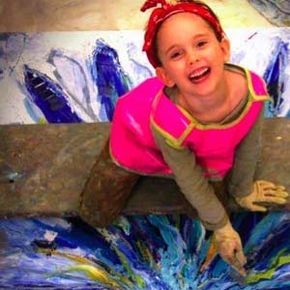 “Child prodigy painter Autumn de Forest at age 7Photo courtesy Autumn de Forest
“Child prodigy painter Autumn de Forest at age 7Photo courtesy Autumn de Forest
Child prodigies wouldn’t be considered such if they never had the opportunity to discover their talents. Let’s take the example of Autumn de Forest, an 8-year-old who had spent plenty of time drawing with crayons and pencils before she recognized her true artistic abilities. Her father was in the basement staining a piece of wood when the then-5-year-old asked if she could use some of the leftover materials to play. Shortly thereafter, her father turned around to find quite a surprise. Autumn — using the stain and a spare piece of wood — had created a work that displayed an artistic ability far beyond her years.
The de Forests provided their daughter with access to large canvases and fine-arts supplies, and she began creating rather astounding works of abstract expressionism with a strong sense of form and control. Autumn began showing her works at "art-in-the-park" type functions and quickly gained attention for her undeniable talent. Before long, she was entering juried competitions where her works were viewed alongside those of dozens of adult artists — and she was winning. Now, the 8-year-old’s works — mostly oil paintings on 4-foot-by-5-foot canvases — sell for as much as $25,000.
Autumn’s parents concede that a 5.5-inch-by-11-inch segment of one of her large canvases — duplicated with crayons and construction paper — wouldn’t be the type of thing that would end up at auction (maybe just on the fridge). It wouldn’t be unlike the Wright Brothers building bird houses, or Mozart playing the harmonica. Unless you find a child’s specific talent — and provide him or her with the exact means needed to express it — it may go undiscovered. As Autumn’s father points out, we don’t see many gifted teenage orchestra conductors because of the near-impossibility of a child having the opportunity to work with an 80-piece orchestra. But if that opportunity did exist, we might soon see young gifted conductors emerge from the ranks.
So, how do you tell the prodigies from the other toddlers?
The Right Tool for the Job
Some prodigies are easier to spot than others. Take Marie Curie, the Nobel-prize-winning chemist. Before she was 5 years old, she had taught herself how to read — in French and Russian. Pablo Picasso was drawing and painting as soon as he was old enough to demand a brush. Violinist Jascha Heifetz was performing music publicly by age 5.
But not all prodigies can do math before they graduate kindergarten. While "child prodigies" generally refers only to people whose if their talents are revealed by age 11, plenty of highly talented children prodigies develop their abilities a bit later in their life (like mathematician/philosopher Blaise Pascal, who got turned on to geometry at the ripe old age of 12).
Some prodigies may gravitate toward their individual talents, others will stumble upon them, and still others will need the means for expressing their talents put directly before them. This provides as good excuse as any to expose your child to many different academic and artistic pursuits. As Autumn’s father points out, there’s no telling what talent your child has that may only be expressed with the right combination of tools, instruments and intellectual exposure.
If your kid is a naturally gifted violinist who’s given nothing but drum kits, the odds are quite uncertain that the potential for violin mastery will transfer to excellence in percussion. Likewise, your child may have no inclination to play the violin, but would make your jaw drop if you saw him or her on the drums.
A prodigy’s interest and ability are usually linked — you don’t hear too many stories about a science prodigy who would rather play video games. And, speaking of video games, if your child is constantly playing them, enroll him or her in a basic computer-programming class. That desire to play could be the clue to a hidden talent.
When you’ve provided access to as many physical activities, intellectual undertakings and art forms as possible, you may find your child is a prodigy, after all. Regardless, he or she will be better off for the pursuit.
Lots More Information
Related Articles
- 10 Healthy Breakfast Tips
- Foster Your Baby’s Intelligence
- Can you really make your child smarter?
- CafeMom’s Top 10 Tips for New Moms
- Breakfast Quiz
- Is it OK for babies to watch TV?
- Child Development: Helping Your Baby Grow and Learn
Sources
- Autumn de Forest. (Aug. 20, 2010)http://www.autumndeforest.com/
- Chillot, Rick. "10 child prodigies (who actually ended up doing something)" Mental Floss. Dec. 10, 2007. (Aug. 25, 2010)http://edition.cnn.com/2007/LIVING/worklife/12/10/mf.child.prodigies/index.html
- Golomb, Claire. "The development of artistically gifted children: selected case studies." Psychology Press, 1995. ISBN 0805815244, 9780805815245.http://books.google.com/books?id=G_ec1hS7lIAC&printsec=frontcover&source=gbs_atb#v=onepage&q&f=false
- Hancock, David. "Child prodigy, 14, commits suicide." CBS News. March 19, 2005. http://www.cbsnews.com/stories/2005/03/18/national/main681735.shtml
- Quart, Alissa. "Hothouse Kids: How the Pressure to Succeed Threatens Childhood." Penguin, 2007. ISBN 0143111914, 9780143111917.http://books.google.com/books?id=nbULR0WHPeQC&printsec=frontcover&source=gbs_atb#v=onepage&q&f=false
- Sachs, Andrea. "The Downside of Being a Child Prodigy." Time. Sept. 6, 2006.http://www.time.com/time/arts/article/0,8599,1532087,00.html
- Telephone interview with Autumn de Forest. Aug. 20, 2010.
- Telephone interview with Douglas de Forest. Aug. 20, 2010.
- Telephone interview with Katherine de Forest. Aug. 20, 2010.
- The Mozart Project. "Mozart’s Life." (Aug. 25, 2010)http://www.mozartproject.org/biography/index.html



































